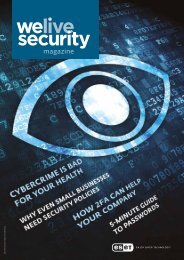magazine
You also want an ePaper? Increase the reach of your titles
YUMPU automatically turns print PDFs into web optimized ePapers that Google loves.
8 tips to<br />
protect<br />
your business<br />
Shutterstock © Nata-Lia<br />
By Carole Theriault, Director, Tick Tock Social<br />
We all know that having employees<br />
trained in safe computing practices is a<br />
good idea. Not only does it help to protect<br />
the integrity of the network, but having<br />
alert and informed users can provide an<br />
extra layer of security as they can raise the<br />
alarm if they see something suspicious.<br />
The problem many companies face is how<br />
to get users on board. Some companies use<br />
fear tactics, threatening reprimands and even<br />
dismissal if users are found to have breached<br />
protocol. Having IT teams act like office<br />
authorities may seem like a good idea, but<br />
it does have a serious downside: a user who<br />
screws up or sees something suspicious<br />
may shy away from reporting the problem<br />
to avoid the consequences.<br />
There is a better approach. It does take<br />
some resources to set up, but running an<br />
internal security campaign that informs and<br />
encourages users about the key security points<br />
helps to safeguard your own network, and it<br />
will also provide them with skills they can use<br />
at home to keep their own computers free from<br />
malicious attacks.<br />
With that in mind, we’ve created eight<br />
security tips for you to share with your employees.<br />
Security tips<br />
Security breaches are no fun for anyone,<br />
and are best avoided at all costs. While you<br />
will have security in place to protect the<br />
network, you’ll need employee help to keep<br />
risks to a minimum and alert you if they see<br />
something suspicious. Check out these tips<br />
to help you prevent any of the bad stuff<br />
from getting in:<br />
1) Keep sensitive information out of sight.<br />
When you have visitors in the office, keep all sensitive information<br />
out of sight. Avoid leaving any information lying around, on your<br />
desk, shared meetings rooms and at the printer or photocopier.<br />
2) Lock your devices.<br />
Set your computer, laptop, tablets and mobiles to lock automatically<br />
after two minutes of non-activity, keeping them safe from prying eyes.<br />
3) Think before you share information on the phone.<br />
Avoid giving away employee, financial or sensitive company information<br />
on the phone. Try to verify the caller’s identity. And if something<br />
like this doesn’t feel right, report it to your boss or the IT team.<br />
4) Consider using an application to manage passwords.<br />
Having strong, unique passwords for each login is important, but impossible<br />
for users to remember. Use a password manager – then you only need to<br />
remember one password. Remember to make your master password strong.<br />
5) Watch out for suspicious emails and dodgy links.<br />
Suspicious emails and links should not be opened or even previewed.<br />
Just delete them. Opening or viewing these emails and links can<br />
compromise your computer and invite in an unwanted problem.<br />
6) Tell IT before you connect personal devices to the network.<br />
Devices like USBs, music players and smartphones can be compromised<br />
with code waiting to launch as soon as they are plugged into a computer.<br />
Talk to IT and let them make the call to keep you and your company safe.<br />
7) Don’t install unauthorized apps or programs on your work devices.<br />
Check with IT before installing unauthorized programs on your<br />
company devices. Malicious applications often pose as legitimate<br />
programs, like a game, a tool, and even security software!<br />
8) Avoid using an unprotected network.<br />
When you travel, you might be tempted by free WI-FI. The issue is that these<br />
networks can be compromised. Make sure you talk to IT before you connect,<br />
so they can provide you with a VPN to make your connections more secure.<br />
welivesecurity.com 35



